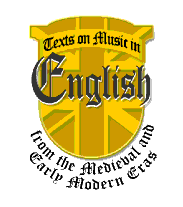 TME SEARCH
TME SEARCH
 TME SEARCH
TME SEARCH
This utility permits searching for words or phrases, and narrowing down a query either to texts from published editions only, or to manuscript transcriptions only. You can select any number of centuries in which to search. You can choose to have matched lines of the text shown by default in the search results. If the relevant box is unchecked, matched lines will be hidden until you click “see matches” to show them. Rules and hints are given further down in this page. Note that cookies must be enabled in your browser to search.
| Typed search | Results |
|---|---|
| song | Finds texts that contain “song” or “plainsong” or “pricksong” etc. |
| temple king | Finds texts that contain both “temple” and “king” (or “striking” etc.) |
| minim OR rest | Finds texts that contain either “minim” or “rest” but not necessarily both |
| "tuning songs" | Finds the exact phrase “tuning songs” |
| "plaine song" AND rules | Finds texts that contain the exact phrase “plaine song” and also the word “rules” |
| end* | Finds texts that contain “end” as well as “ending” but not “ascending” (the latter word neither starts nor ends with ‘end’ exactly) |
| " ending" [double quotes, leading space] | Only the word “ending” is found |
| mut* end* | Finds texts that contain “gamut” (or “mutuall” or “mutation”) and “end” (or “ended” etc.) but not “commended” (the latter word neither starts nor ends with ‘end’ exactly) |
| "mut* end*" | Finds “mutation ending” |
N.B. In all searches with the asterisk, the search results page may also highlight “fuzzy” matches found in the documents, that is words that neither start nor end with the searched string exactly. This happens if a legitimate hit is found. Such “courtesy” highlighting does not mean that all texts with these words were found. | |